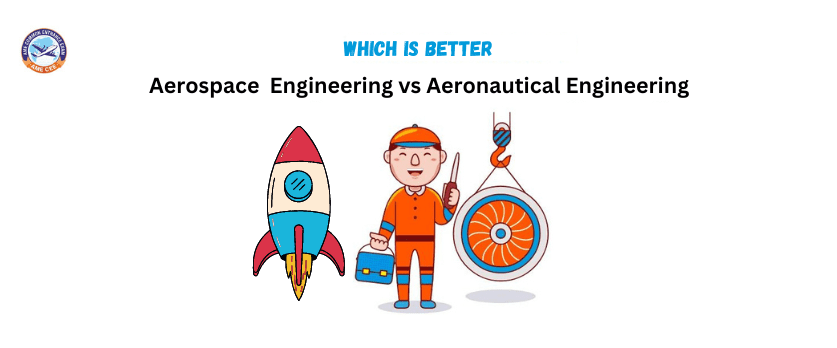The choice between aerospace and aeronautical engineering depends on your specific interests, career goals, and the scope of each field. Here are some key considerations to help you decide which may be better suited for you:
Aerospace Engineering
Scope
Aerospace engineering is a broader field that encompasses both aeronautical engineering and astronautical engineering. It covers atmospheric flight (aircraft) and space flight (rockets, spacecraft).
Versatility
Aerospace engineering offers a wider range of opportunities, allowing professionals to work on both aircraft and spacecraft. This versatility can be appealing if you have an interest in both atmospheric and space-related technologies.
Space Exploration
If your passion includes contributing to space exploration, satellite technology, and interplanetary missions, aerospace engineering provides a platform to work on projects beyond Earth’s atmosphere.
Aeronautical Engineering
Atmospheric Flight Focus
Aeronautical engineering specifically concentrates on aircraft and flight within Earth’s atmosphere. If your primary interest lies in designing and improving airplanes, helicopters, and related vehicles, aeronautical engineering may be the better fit.
Specialization
Aeronautical engineering allows for specialization in areas like aerodynamics, propulsion, avionics, and materials, providing an opportunity to become an expert in a specific aspect of aircraft design.
Focused Expertise
If you have a strong passion for atmospheric flight and want to delve deeply into the challenges and innovations related to airplanes, aeronautical engineering offers a more focused expertise.
Considerations for Your Decision
Personal Interest
Consider your personal interests and whether you are more intrigued by the challenges of designing and improving aircraft or if you are drawn to the broader spectrum of aerospace technologies.
Career Goals
Think about your long-term career goals. If you aspire to work on both aircraft and spacecraft or have a keen interest in space exploration, aerospace engineering may align better with your aspirations.
Job Market and Opportunities
Research the job market and opportunities in your region or the location where you intend to work. Consider the demand for aerospace or aeronautical engineers in your desired industry or sector.
Ultimately, both aerospace and aeronautical engineering offer rewarding career paths, and the “better” choice depends on your individual interests and goals. Some professionals may find fulfillment in the versatility of aerospace engineering, while others may thrive in the specialized focus of aeronautical engineering. It’s essential to align your choice with your passions and the kind of work that excites you most.
FAQs on Choosing Between Aerospace and Aeronautical Engineering
Q1. What is the primary difference between aerospace and aeronautical engineering?
A. Aerospace engineering covers both atmospheric and space flight, while aeronautical engineering focuses solely on atmospheric flight.
Q2. Are the career opportunities different for aerospace and aeronautical engineers?
A. Yes, aerospace engineers have a broader scope, working on both aircraft and spacecraft, while aeronautical engineers specialize in aircraft.
Q3. Do aerospace and aeronautical engineers require the same skill set?
A. There is overlap in required skills, but aerospace engineers may need additional knowledge in astronautics, orbital mechanics, and space-related technologies.
Q4. Can an aerospace engineer work on aircraft, and vice versa?
A. Yes, aerospace engineers can work on aircraft, but aeronautical engineers primarily focus on atmospheric flight and may not work on spacecraft.
Q5. Which field offers more opportunities for specialization?
A. Aeronautical engineering may offer more specialized roles within atmospheric flight, such as aerodynamics, propulsion, avionics, and materials.
Q6. Are salaries comparable between aerospace and aeronautical engineering?
A. Salaries are generally comparable, but factors such as location, industry demand, and individual qualifications can influence earning potential.
Q7. Do aerospace and aeronautical engineers collaborate on projects?
A. Collaboration is common, especially in multidisciplinary projects where expertise from both fields is valuable.
Q8. Can I switch between aerospace and aeronautical engineering in my career?
A. Yes, skills acquired in one field are transferable, and professionals often transition between aerospace and aeronautical engineering.
Q9. Which field offers more opportunities for involvement in space exploration?
A. Aerospace engineering is better suited for those interested in space exploration, as it covers both atmospheric and space technologies.
Q10. How do I decide between aerospace and aeronautical engineering for my career?
A. Consider your interests and long-term goals. If you’re passionate about both aircraft and spacecraft, aerospace engineering may be more suitable, while aeronautical engineering provides focused expertise in atmospheric flight.
To become an aerospace engineer you may could join aerospace engineering through AME COMMON ENTRANCE EXAM (AME CEE) this examination you may join Aerospace Engineering approved by AICTE.


